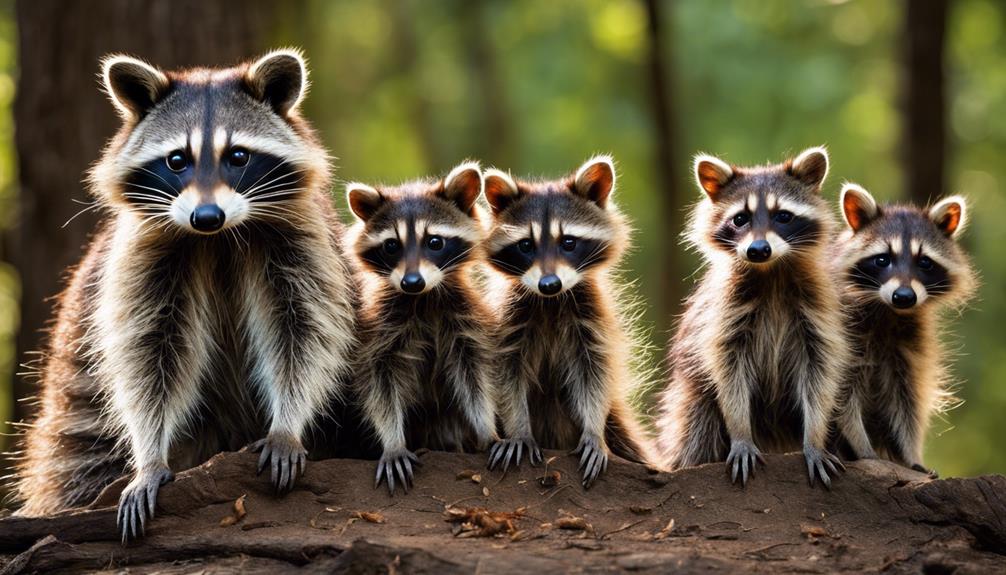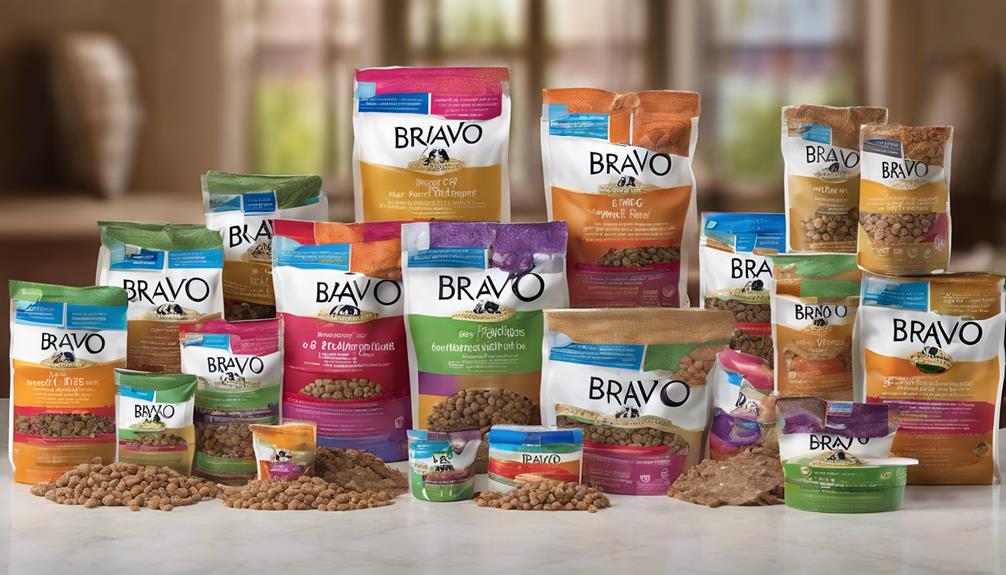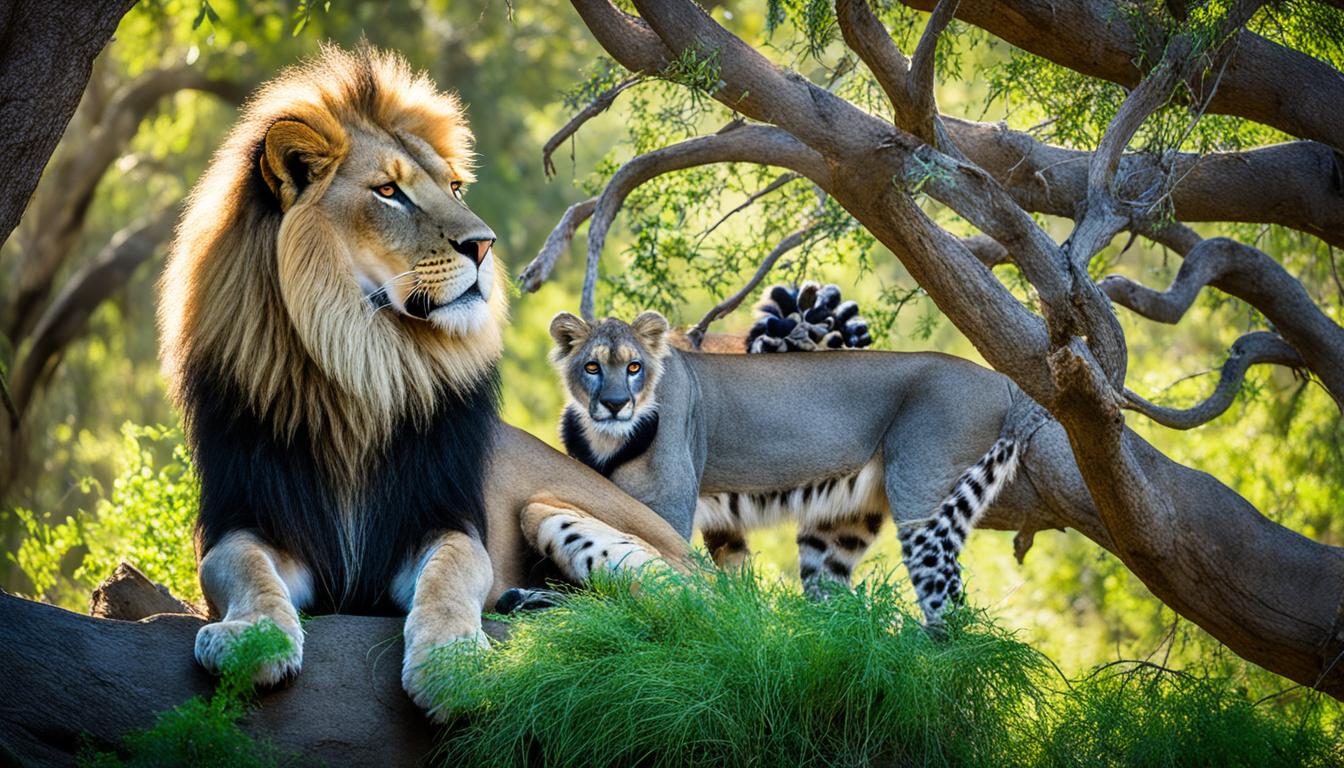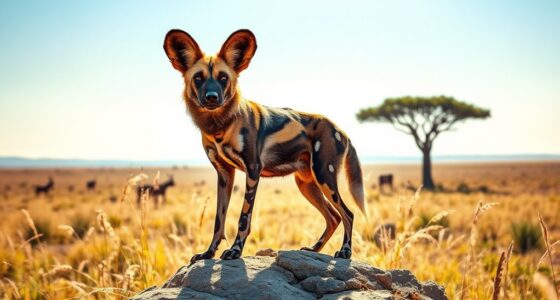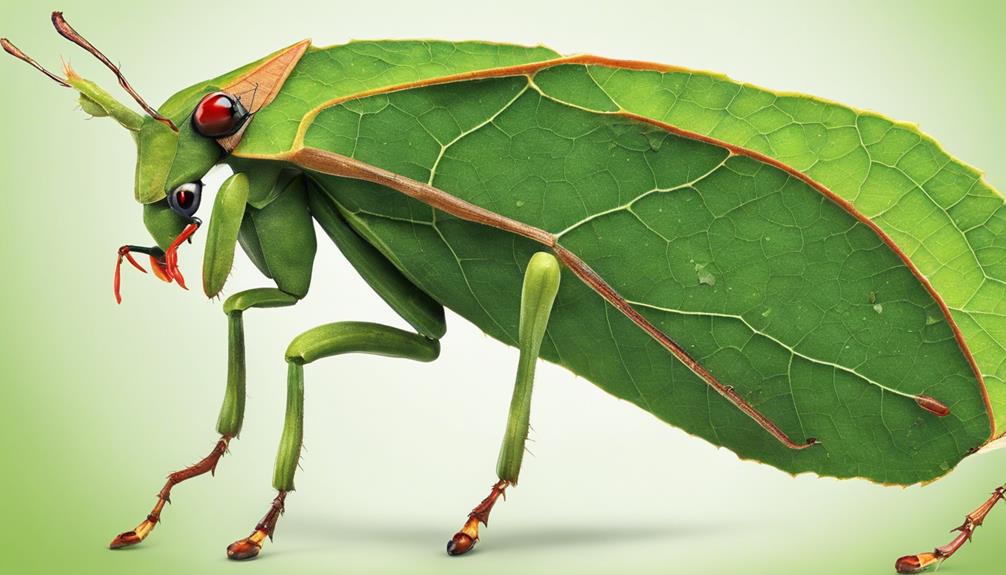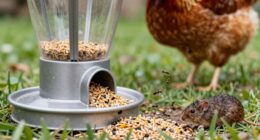Embark on a journey with me to uncover the raccoon family's remarkable adventure from Florida to California! They embarked on a cross-country trip in a moving truck and now call Oakland Zoo their home. Witness their ability to adapt and persevere in different surroundings, flourishing in urban areas and making use of a variety of food sources. The heartwarming support from the community and conservation initiatives are truly motivating. Delve into their habitat adjustment, feeding behaviors, and the importance of preserving wildlife. Discover the traits of the Procyonidae family and the significance of safeguarding habitats for biodiversity. Explore the captivating world of raccoons and their extraordinary tale!
Key Takeaways
- The raccoon family traveled from Florida to California in a moving truck.
- Discovered in a crate by a truck driver and now reside at Oakland Zoo.
- Demonstrated adaptability in diverse habitats during their journey.
- Settled in a secluded area at the zoo receiving care and monitoring.
- Showcased resilience and habitat adjustment skills in urban environments.
Raccoon Family Background
How did the raccoon family end up initiating on their unforeseen journey from Florida to California?
The raccoon family set off on their cross-country escapade when they caught a ride in a moving truck, unknowingly crossing states until they reached the Bay Area. Found in a crate by the truck driver, their journey took an unexpected twist, leading them to the Oakland Zoo.
The resilient raccoons, despite the challenges faced during their travels, are now finding comfort in a secluded area at the zoo. The zoo staff, committed to ensuring the raccoon family's well-being, are providing them with the necessary care, food, and water to help them adjust to their new surroundings.
This surprising journey has brought the raccoon family to a new home, where they can prosper under the vigilant gaze of the zookeepers.
Florida to California Journey

I'll be explaining how the raccoon family journeyed from Florida to California.
Touching on their cross-country migration and habitat adaptation.
This journey was no small feat, requiring them to travel a substantial distance to reach the Bay Area.
Despite facing challenges, their resilience and adaptability helped them safely navigate this long trek.
Cross-Country Migration
Setting off on a remarkable journey from Florida to California, the raccoon family found themselves hitching a ride in a moving truck, covering a significant distance to reach the Bay Area. Upon their safe arrival at the Oakland Zoo, zoo staff discovered the raccoons nestled in a crate, tired but resilient from their cross-country migration. Currently, the raccoons are settling in a secluded area, receiving care and monitoring from the attentive zoo staff. Below is a table highlighting key aspects of the raccoon family's journey:
| Aspect | Detail |
|---|---|
| Starting Point | Florida |
| Destination | Bay Area, California |
| Mode of Travel | Moving truck |
| Discovery | Found in a crate by zoo staff at Oakland Zoo |
This incredible journey showcases the raccoons' adaptability and the dedication of the zoo staff in ensuring their well-being.
Habitat Adaptation
Upon embarking on their journey from Florida to California, the raccoon family demonstrated remarkable adaptability as they moved through diverse habitats and landscapes. Procyonids, known for their habitat adjustment skills, smoothly shifted from forests to urban environments, showcasing their ability to thrive in varying settings.
This expedition highlighted how raccoons excel as opportunistic omnivores, utilizing a wide range of food sources along the way. Urban areas provided essential shelter and sustenance for the raccoons, aiding in their successful migration. Their capacity to navigate human-altered landscapes while seeking suitable habitats speaks to their resilience and flexibility.
The raccoon family's ability to adapt to different environments not only guaranteed their survival but also emphasized their remarkable skills in acclimating to new surroundings.
Resilience and Adaptability
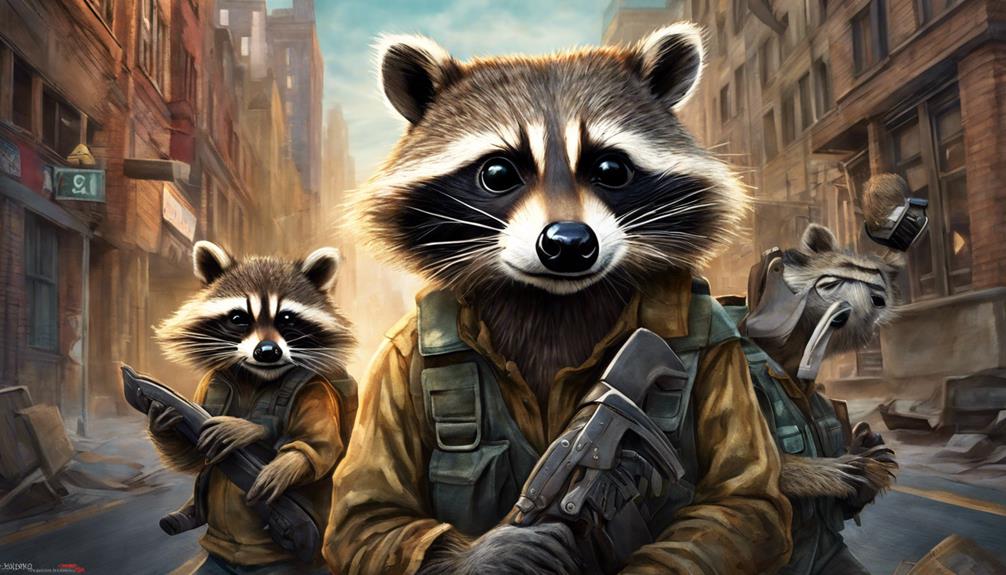
Raccoons exhibit remarkable resilience and adaptability, traits that help them survive in ever-changing environments.
Their resourceful problem-solving skills enable them to thrive amidst challenges, showcasing their intelligence and versatility as a species.
Despite facing habitat loss and human encroachment, raccoons navigate these obstacles with ingenuity, embodying the essence of resilience in the animal kingdom.
Survival in Changing Environments
Adapting to diverse environments, I navigate changing landscapes with resilience and adaptability, showcasing my survival skills as a raccoon. Here are three ways I excel in urban habitats:
- Adaptive Behaviors: I've honed my skills to scavenge for human food, showing my ability to adjust to city life.
- Resilient Nature: Despite human alterations, I thrive by finding creative solutions to survive in urban areas.
- Navigating Changes: My success in coexisting with humans reflects my capacity to adapt effectively to evolving environments.
Innovatively blending my instincts with learned behaviors, I thrive in urban settings by embracing change and utilizing my resourcefulness to secure food and shelter.
Resourceful Problem-Solving Skills
Thriving in diverse environments requires a raccoon to constantly innovate and problem-solve, showcasing their remarkable resilience and adaptability. Raccoons' adaptive nature enables them to excel in urban and natural settings, demonstrating high levels of intelligence in finding food and maneuvering obstacles.
Their cognitive flexibility allows them to adapt swiftly to changing conditions, utilizing tools and innovative strategies. These resourceful problem-solving skills are essential for their survival in various climates and ecosystems. Through extensive studies, raccoons have revealed their ability to tackle challenges with ingenuity and adaptability, highlighting their capacity for innovative problem-solving.
Their prowess in overcoming obstacles underscores their versatile nature, making them adept at thriving amidst diverse environmental conditions.
Thriving Amidst Challenges
Amidst various challenges, the family of raccoons demonstrates remarkable resilience and adaptability in their quest for survival.
- Raccoons, like coatis, exhibit adaptive radiation, diversifying to thrive in different environments.
- Their ability to adapt their diet makes them resilient in the face of fluctuating food sources.
- Raccoons' knack for problem-solving aids in overcoming obstacles, ensuring their survival in ever-changing landscapes.
The family of raccoons not only showcases resilience in urban and natural settings but also adapts to human disturbances with ease. Their reproductive flexibility further solidifies their population sustainability, highlighting their remarkable ability to thrive amidst challenges.
Discovery in Moving Truck

Upon opening the crate in the moving truck, the surprise of discovering a family of raccoons during their unforeseen journey from Florida to California was quite astonishing. It was a unique situation that necessitated immediate attention and care. The truck driver promptly contacted zoo staff upon the detection of the raccoons in the crate within the truck. The zoo personnel quickly responded, aiding in relocating the raccoons and ensuring their well-being during the shift.
| Raccoons Found | Location | Assistance Provided |
|---|---|---|
| Family | Moving Truck | Relocation |
| Care | ||
| Shelter |
The collaboration between the truck driver and the zoo staff was vital in guaranteeing the safe transfer of the raccoons to a suitable environment. The raccoons were settled in a secluded area at the Oakland Zoo, where they received food, water, and a secure space to acclimate. The ongoing monitoring by the zoo staff ensures the raccoons' adjustment and welfare in their new home.
Care at Oakland Zoo
Ensuring the welfare of the raccoons at Oakland Zoo is our top priority.
- The raccoons at Oakland Zoo have been settled in a secluded area to provide them with a stress-free environment, allowing them to adapt comfortably to their new surroundings.
- Zoo staff guarantee the raccoons have access to food and water to meet their dietary needs, making sure they receive the proper nutrition for their health and well-being.
- The raccoons are being closely monitored to track their adjustment and well-being in their new surroundings, allowing us to provide any necessary care or support they may require during this change period.
At Oakland Zoo, we're committed to providing the best care for our raccoons, ensuring they're safe, comfortable, and well looked after. Our dedicated team works tirelessly to monitor their progress, provide for their needs, and make sure they feel at home in their new habitat.
The well-being of our raccoons is of utmost importance to us, and we work diligently to create an environment where they can thrive and be happy.
Public Reaction and Support
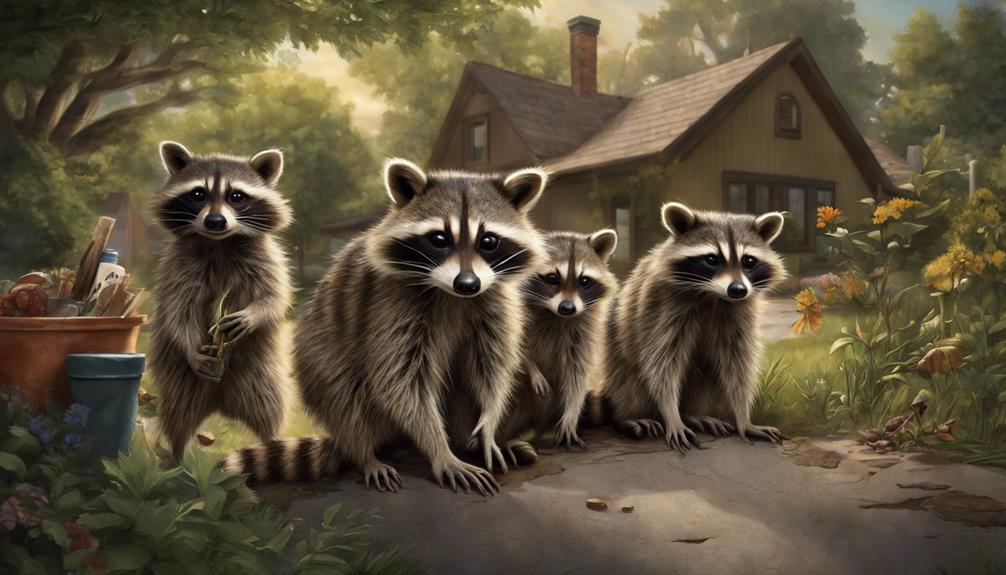
I'll begin by discussing how the community reached out to offer help, the active engagement on social media platforms, and the availability of volunteer programs. These points will shed light on the strong support the raccoon family received from the public and how individuals contributed to their well-being.
Understanding these aspects will showcase the impact of public involvement and the positive outcomes it can bring for wildlife conservation efforts.
Community Outreach Efforts
Amidst the heartwarming comments flooding social media posts, a resounding sense of gratitude resonated for the officers' dedicated rescue of the raccoon family.
The public's appreciation for animal protection efforts and swift actions in Boulder, Colorado emphasized the importance of wildlife conservation.
The viral video of the raccoon family's rescue increased awareness of urban wildlife encounters.
Many found inspiration in the human-animal compassion displayed, showcasing the significance of public support in wildlife protection.
The community's response highlighted the dedication of animal protection officers and the need for ongoing efforts in conservation.
The rescue operation not only saved the raccoon family but also served as a reminder of the essential role individuals play in safeguarding wildlife and promoting coexistence in urban environments.
Social Media Engagement
The overwhelming support and positive reactions on social media towards the raccoon family rescue operation underscored the community's deep appreciation for the officers' efforts.
The viral video of the rescue not only touched hearts but also shed light on the critical animal protection efforts needed in urban areas.
The heartwarming comments flooding the posts highlighted the importance of wildlife encounters in cities, increasing public awareness.
Gratitude towards the rescuers for their swift and compassionate actions was evident in the comments, showcasing the impact of social media engagement in promoting animal welfare.
This event serves as a reminder of the significance of coming together to support and protect our urban wildlife, emphasizing the role each individual can play in animal rescue efforts.
Volunteer Assistance Programs
With the establishment of volunteer assistance programs to aid the raccoon family's relocation to the Oakland Zoo, public interest in supporting their care has surged. Volunteers are making a significant impact by providing enrichment activities, closely monitoring the raccoons' behavior, and offering essential support to guarantee their well-being.
The proactive involvement of the community showcases a strong commitment to wildlife conservation efforts, highlighting the importance of collective action in safeguarding the Procyonidae family. By participating in these volunteer programs, individuals are actively contributing to the positive outcomes for these raccoons and promoting awareness about the significance of preserving biodiversity.
The collaboration between volunteers and wildlife professionals underscores the power of grassroots initiatives in fostering animal welfare and conservation.
Wildlife Preservation Importance
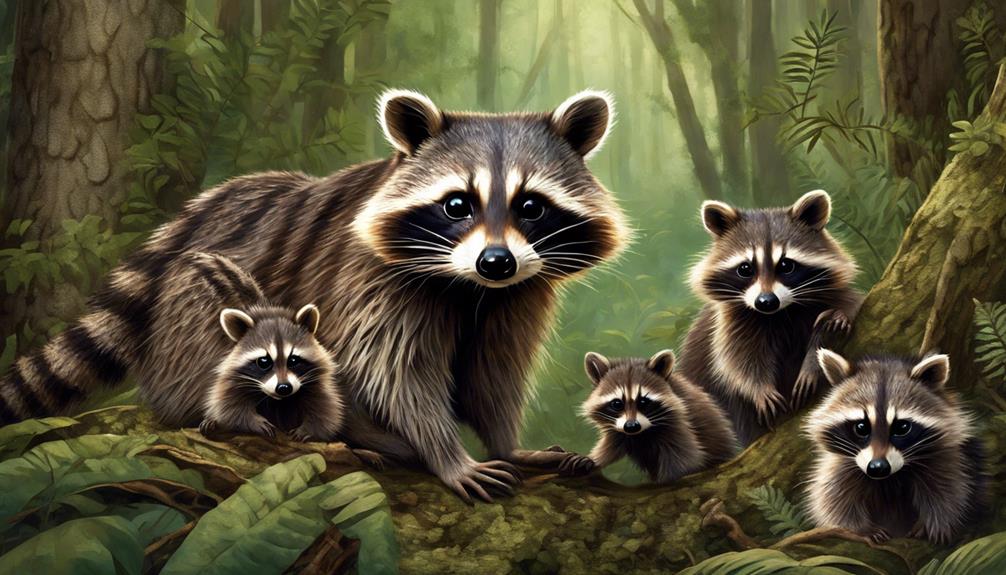
Preserving wildlife is essential for maintaining biodiversity and ecosystem balance. By protecting species like raccoons, we guarantee they can continue their significant roles in the environment. Raccoons play an important part in seed dispersal and insect control, contributing to the health of ecosystems. Understanding their habitats is critical to developing effective conservation strategies that safeguard their populations. Conservation efforts not only help raccoons but also aim to reduce conflicts between humans and wildlife, promoting sustainable coexistence. Supporting organizations such as the Oakland Zoo is crucial in furthering wildlife conservation and education initiatives. To emphasize the importance of wildlife preservation, let's explore deeper into the benefits it brings:
| Benefits of Wildlife Preservation | ||
|---|---|---|
| Maintains Biodiversity | Supports Ecosystem Balance | Protects Habitats |
Procyonidae Characteristics
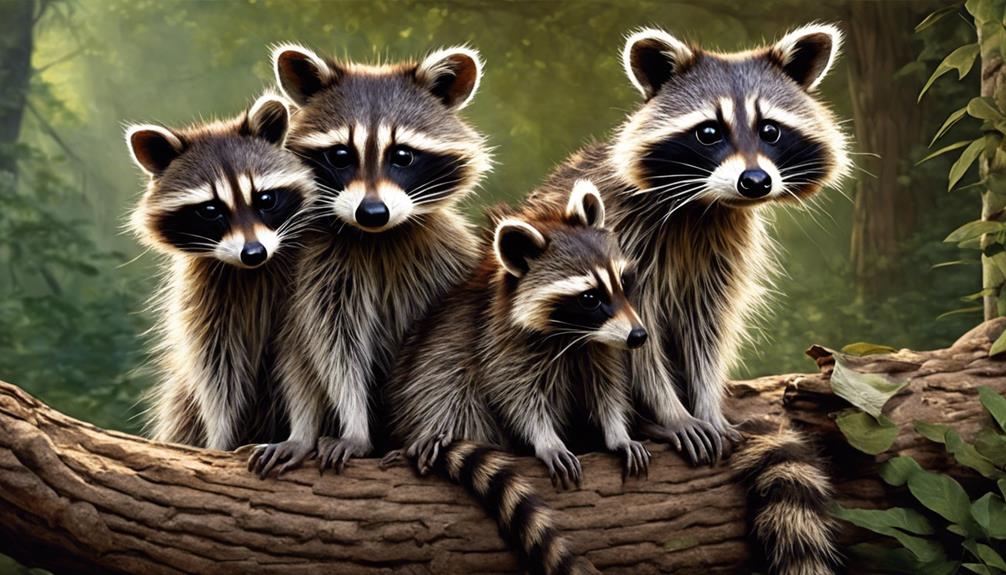
Exploring the characteristics of Procyonidae reveals their unique adaptations for an omnivorous diet and distinctive morphological features.
Common morphological characteristics of Procyonidae include a shortened rostrum and flat mandibular fossa, which facilitate their diverse dietary habits.
Some species within Procyonidae, like kinkajous, possess a prehensile tail that aids in climbing and gathering food, along with specialized femoral structures for agile movement in trees.
Procyonidae showcase adaptations for an omnivorous diet, enabling them to consume a wide range of foods to meet their nutritional needs efficiently.
These characteristics highlight the versatility and evolutionary success of Procyonidae in various habitats. From their anatomical structures to dietary preferences, these features offer insights into how these small mammals thrive in diverse environments.
Distribution and Habitat
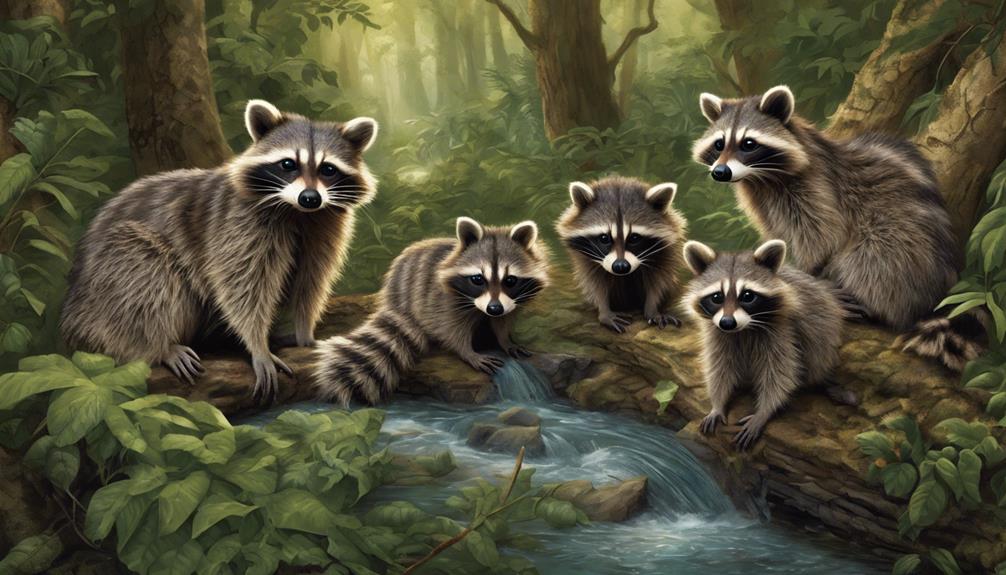
In North and Central America, raccoons from the Procyonidae family can be found inhabiting a variety of environments ranging from forests to urban areas. These adaptable creatures have also been introduced to regions like Germany. Their ability to thrive in diverse habitats such as forests, wetlands, and urban settings showcases their remarkable flexibility. Raccoons are known for their foraging behavior, particularly near water sources, where they hunt for crayfish, fish, fruits, and nuts.
Urban raccoons have successfully adapted to human-modified landscapes, making use of resources like garbage bins and buildings for shelter and food. However, conservation efforts are crucial to safeguard raccoon populations. Challenges such as habitat loss, human-wildlife conflicts, and disease transmission risks pose significant threats to their well-being.
Feeding Ecology and Reproduction
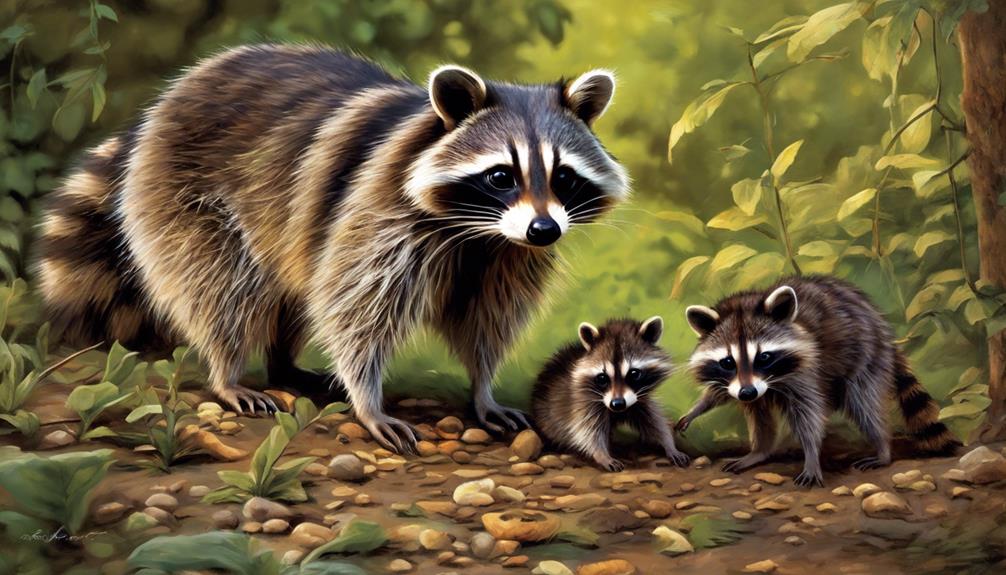
Adapting to various environments, raccoons exhibit opportunistic feeding habits and reproductive patterns that highlight their remarkable survival strategies. When it comes to feeding behavior, raccoons are true food connoisseurs, enjoying a diverse diet that includes fruits, nuts, insects, small mammals, and even the occasional human food scraps. They're strategic eaters, opting for high-calorie foods to store fat reserves important for the long winter months. Raccoons' dexterous front paws play a significant role in their feeding ecology, allowing them to skillfully manipulate and access various food sources with ease.
In terms of reproduction, raccoons have a well-defined gestation period of around 63 days. During late winter to early spring, female raccoons give birth to litters ranging from 1 to 7 kits. These young raccoons stay with their mother for approximately 12 months, learning essential survival skills before venturing out on their own. Raccoons' reproductive patterns are intricately connected to their adaptive behaviors, ensuring the continuation of their resilient species.
Frequently Asked Questions
What Is the Family of the Raccoons Called?
The family of raccoons is called a 'nursery' or a 'gaze.' It usually consists of a mother raccoon, known as a 'sow,' and her offspring, called 'kits' or 'cubs.' Raccoon families are close-knit and engage in social behaviors.
What to Do if You See a Family of Raccoons?
If I see a family of raccoons, I maintain a safe distance and contact local authorities for assistance. It's important to avoid feeding or interacting with them to prevent conflicts. Securing garbage cans helps deter them from my property.
What Is a Member of the Raccoon Family Beginning With Co?
Cozumel Island Raccoon, a raccoon family member starting with 'co,' is Procyon pygmaeus. Found near water in Cozumel, they eat crayfish, crabs, frogs, and plants. Conservation efforts are crucial as they're endangered.
What Else Is in the Racoon Family?
In the raccoon family, we find a fascinating array of species like coatis, kinkajous, olingos, and ringtails, each showcasing unique adaptations. Their diversity captivates, from the bandit-like raccoons to the social coatis, making them truly remarkable creatures.
Can Raccoons Eat Dog Food?
Yes, raccoons can eat dog food, but it’s not recommended. The ingredients in small breed dog food may not be suitable for raccoons and can be harmful to their health if consumed regularly. It’s best to keep raccoons away from dog food to prevent any potential health issues.
Conclusion
As the sun began to set, a rustling sound could be heard coming from the shadows. Slowly, a masked face peeked out, followed by more curious eyes.
The raccoon family, once hidden in the darkness, now revealed their playful nature as they ventured out into the night. What adventures await them as they explore their new surroundings? Only time will tell.
Stay tuned for more updates on the fascinating lives of these furry creatures!
